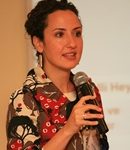I quite agree with what Michael Edwards said about the Occupy movement in a recent interview with Philanthropy News Digest: ‘That’s what social movements do. They may not have a direct impact on policy in the short term, but they give large numbers of people permission to talk about critical issues in a way they weren’t able to before, and they tend to change the cultural conversation in ways that are important over the long term. … It has done something pretty remarkable in terms of changing the national, and in some ways international, debate about inequality. Will it be able to transform itself into something more formal, politically speaking? Will it develop a policy platform? Will it align itself with other existing movements for change? I don’t know. But even if it disappeared tomorrow, its impact would continue to be felt.’
Philanthropy for social change, in its most basic form, as I see it, is comprised of three ingredients: one part acting (doing or funding), one part reflecting and one part sharing.
Edwards reminds us that in order for social change to take place, first a conversation has to take place. In another segment of his interview, he talks about the importance of creating such spaces for stakeholders to come together and determine the best option for public benefit, rather than being the lone wolf funder that proposes (and funds) solutions developed in vitro. It is these spaces that enable conversations which lead to ownership and participation – exactly what we say governments should do more often when it comes to making decisions about public spending.
Sounds simple. Funders know this; yet how often is it put into action? As my father, a psychiatrist of 40 years, would say: ‘To know and not to act, is not to know.’
So why is there no action? Why do most foundations have program strategies, systems and criteria for projects and funding, yet often lack such defined processes for reflection and sharing? This is what Peggy Dulany, daughter of David Rockefeller, and her son, Michael Quattrone, had us reflecting on at the 5th Annual Sabanci Foundation Philanthropy Seminar, under the title ‘Philanthropy from Generation to Generation’.
In such a setting, the 200+ audience (leaders from NGOs, government and foundations, along with academics and high school students) expected Peggy and her son, as members of the Rockefeller family, to talk about the legacy of money and institutions that the family, for generations before them, contributed to the world.
Yet Peggy and Michael took us down a completely different road: they talked about the values of leadership by example and the importance of self-reflection, empathy, awareness and other facets of emotional intelligence. They led a very interactive discussion with the audience about creating safe spaces – whether it be for an NGO working in the prison system, a philanthropist funding education or a high school student doing community work.
It is these spaces, and what we learn and gain from them, that enable philanthropy to pass from generation to generation, they say. Peggy applies this approach most actively now through the NGO she established more than 20 years ago, Synergos. Her son Michael does this through the NGO he recently established, called Hearthfire. He handed me his business card before we took to the stage; under his name was a very humble title: ‘Beginner’.
Peggy, having had years of experience in this sector, did admit that the greatest challenge is the measurement of impact. The creation of such spaces (Synergos has coined the term ‘bridging leadership’) involves the non-tangibles that many in the philanthropic sector are not at ease with – even though it is known that this is such an important ingredient. Yet just as the development and philanthropic community has been debating intensely through the recent Bellagio Initiative and other platforms, it is also known that measures such as GDP and the like are not indicators of wellbeing, even though they are measurable. Maybe the time really has come to know and to act, to concern ourselves less with financial capital and more with social capital by applying the critical ingredients of reflection and sharing, through creating spaces – whether on Wall Street or in a community centre – to bring forth positive social change for generations to come.
Filiz Bikmen is director of programs and international relations at the Sabanci Foundation and a member of the Governing Council of the European Foundation Centre.




Comments (0)